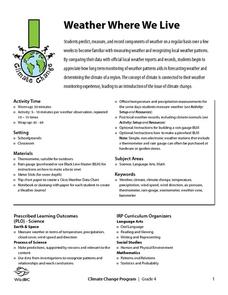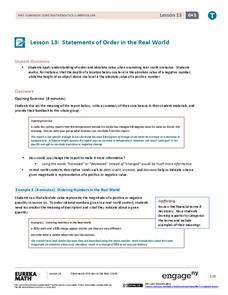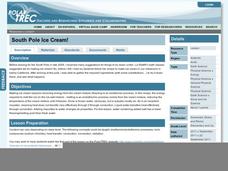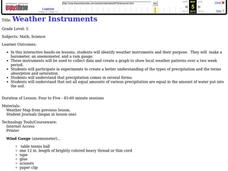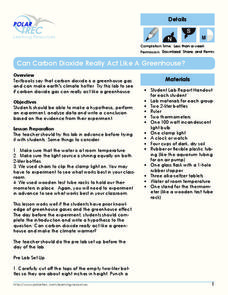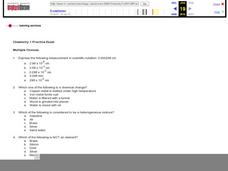Curated OER
Weather Watchers
Students identify basic weather instruments and how they are used to record weather data. Students define several vocabulary terms as stated in lesson. Students use basic instruments to record weather data in their area. Students use the...
Michigan State University
Gases Matter
Young scientists learn that seeing isn't necessarily believing when it comes to the states of matter. After performing a fun class demonstration that models the difference between solids, liquids, and gases, children complete a series of...
Nuffield Foundation
Measuring the Rate of Metabolism
Plant respiration can be a difficult concept for young biologists to grasp; with a hands-on lab, learners can collect and graph data, then calculate the metabolism rate for the plants they studied. If you do not have a respirometer,...
Wild BC
Weather Where We Live
Over a span of two weeks or more, mini meteorologists record weather-related measurements. What makes this particular resource different from others covering similar activities are the thorough details for the teacher and printables for...
EngageNY
Statements of Order in the Real World
Positive and negative numbers are all around us. Groups read short story contexts and identify a rational number that represents the values in the context. They order the rational numbers and interpret statements of inequality.
Nuffield Foundation
Measuring Respiratory Quotient
How do scientists prove tiny living things respire? Young scientists build a respirometer and measure respiration rates in living creatures. By comparing the measurements of both plants and animals, they understand the similarities.
Polar Trec
South Pole Ice Cream!
How can you turn an ice cream activity into a scientific investigation? It's easy if you know ionic compounds, heat transfer, and the exothermic and endothermic process. Learners will explore the science behind freezing, insulation, and...
Office of the New Jersey State Climatologist
Play Ball! – Or Not…Making a Decision Using Weather Data
Should the game go on or not? An engaging lesson asks small groups to make a decision using weather data. After analyzing a map, an updated forecast, and radar information, groups have to decide whether to cancel a baseball game. They...
Curated OER
Dry Ice: Simply Sublime
A fascinating lesson on states of matter is here for your young scientists. Dry ice is used to challenge learners preconceived notions about how solids work. They discover all sorts of interesting facts about states of matter from...
Curated OER
Properties of Fresh and Sea Water
Students work with three stations to demonstrate the properties of water. They explore water's boiling point, freezing point, and its ability to store heat.
Curated OER
Determining the Molar Mass of a Gas
Young scholars determine the molar mass of a gas. In this molar mass of a gas lesson plan, students use the vapor density of an organic solvent to determine its molar mass. They vaporize the solvent and collect the vapor. Once it is...
Curated OER
Weather instruments
Students explore weather instruments. In this weather lesson, students make rain gauges, anemometers, and barometers following the instructions given in the lesson. Students set up a weather station using their instruments and record and...
California Academy of Science
Climate Change Impacts
Getting kids thinking about climate change now, will hopefully push them into action when they become adults. Young environmentalists discuss the evidence and causes of climate change seen in the state of California. They brainstorm ways...
Polar Trec
Can Carbon Dioxide Act Like a Greenhouse Gas?
Ninety-seven percent of scientists who study climate agree that human activity is warming the planet. Learners explore carbon dioxide as a greenhouse gas, a gas causing this warming, through a hands-on experiment. Once complete, they...
Nuffield Foundation
Investigating Enzymes Used in Laundry Detergent
It's a win-win situation: learn about enzymes and get clean clothes, too. Young scientists add enzymes to a dilution of laundry detergent. They apply them to stained fabrics to determine the effectiveness of the enzyme-filled detergents.
Curated OER
Does Humidity Affect Cloud Formation?
Students use S'COOL data to identify factors that affect cloud formation. They find a data set using the S'COOL database , and use Excel to manipulate the data. Student isolate relevant data, create meaningful graphs from a spreadsheet,...
Curated OER
Dry Season and 'Green' Season in Costa Rica
Students explore the seasonal changes in Costa Rica. In this dry season activity students use the Internet to locate science data then generate data for precipitation.
Orange County Water Atlas
Location, Location, Location…
Young geographers discover not only how to read and recognize coordinates on a map, but also gain a deeper understanding of latitude and longitude and how climate changes can vary significantly across latitudes.
Curated OER
Living in the Greenhouse
Students discuss the different types of climate zones found throughout the world. They participate in activities which relate to real events. They make observations and the consequences of their actions on the environment.
Curated OER
Student Reading - The Unique Properties of Water
Without water there would be no life on this planet. Biology learners find out why by reading this handout. Create a worksheet of questions to answer after the reading. Follow it up with quick demonstrations or laboratory activities that...
Curated OER
Chemistry 1 Practice Exam
Thirty multiple-choice questions and their answers are provided in this resource. It was written for a general chemistry course and queries test takers on scientific notation, mixtures, chemical symbols, electric charges, Dalton's atomic...
Curated OER
World of the Pond
Field trip! The class will review what they know about organisms that dwell in freshwater ponds, then trek down to the old water hole to collect specimens for examination. This includes several web links, useful tips, and an excellent...
Forest Foundation
Fire - How Does it Relate to You?
Forest fires can be a necessary step in keeping a forest healthy, but what happens when they get out of control? Learners investigate the causes and effects of forest fires in two specific areas, culminating in a report about the ways...
Aquarium of the Pacific
States of Matter: Making Ice Cream
Who knew that learning about the states of matter could taste so sweet? This fun hands-on lesson captures the attention of learners as they use what they know about solids, liquids, and gases to create their very own batch of ice cream.
Other popular searches
- Air Temperature and Wind
- Sunlight Air Temperature
- Air Temperature and Wind]
- Snow and Air Temperature
- Candle Air Temperature
- Air Temperature Pressure
- Temperature and Air Movement
- Air Temperature Air Pressure
- Oceans and Air Temperature
- Air Temperature Lesson Plan
- Atmosphere and Air Temperature





